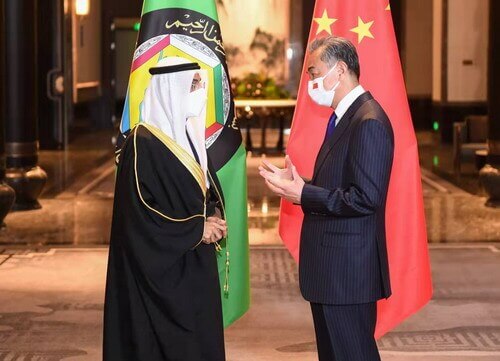This week, Chinese State Councilor and Foreign Minister (FM), Wang Yi, met with with officials from Saudi Arabia, the Gulf Cooperation Council (GCC), Bahrain, Turkey, and Kuwait.
Saudi Arabia
On Monday, Wang held talks with Saudi Arabian Foreign Minister Faisal bin Farhan Al Saud. noting that Faisal was the first FM to visit China in the New Year, Wang said that China supports Saudi Arabia’s Middle East Green Initiative, the Saudi Green Initiative, and advancing the Saudi Vision 2030 plan.
Wang also expressed willingness to expand cooperation with Saudi Arabia in new energy, e-commerce, law enforcement and security, Chinese language teaching, and joint archaeology.
Faisal responded by saying that his government was interested in furthering the Belt and Road Initiative (BRI), and deepening cooperation in oil and gas resources, clean energy, Chinese language teaching, and people-to-people exchanges.
Both sides also exchanged views on international and regional issues of common concern, such as the Iranian nuclear issue, Yemen, and Afghanistan.
GCC
On Tuesday, Wang met with GCC Secretary-General Nayef Falah Mubarak Al-Hajraf. Both sides agreed that conditions are favourable for the establishment of China-GCC strategic partnership and to hold the fourth China-GCC Strategic Dialogue in Riyadh soon. They also agreed to complete the negotiations on a China-GCC Free Trade Agreement at an early date.
Furthermore, Beijing agreed to “share the opportunities of China’s huge market, help the GCC countries become logistics and shipping hubs, and attract more foreign capital and technologies to the Gulf region to accelerate the diversified development of the GCC countries.
Chinese FM held talks on Monday with Saudi Arabian counterpart in east China's Jiangsu. The two sides reached broad consensus on bilateral relations, practical cooperation and multilateral coordination after an in-depth exchange of views. More: https://t.co/Wj1am6XUst pic.twitter.com/kVBHeVr4R2
— China Xinhua News (@XHNews) January 11, 2022
Bahrain
On the same day, the FM held talks with Bahraini Foreign Minister Abdullatif bin Rashid Al Zayani.
Wang pledged China’s support in advancing Bahrain’s “Economic Vision 2030” and strengthening cooperation in areas such as 5G telecommunications, e-commerce, digital economy, and big data. They also agreed to advance cooperation in infrastructure, photovoltaic, new energy, and aerospace.
The leaders also agreed to further enrich people-to-people and cultural exchanges and support Chinese language teaching in Bahrain. Zayani also offered Bahrain’s support to China in hosting the Beijing Olympic Winter Games.
Turkey
On Wednesday, Wang held a meeting with Turkish Foreign Minister Mevlüt Çavuşoğlu. Wang outlined four “hopes” for their mutual relationship:
- Support each other in safeguarding respective sovereignty, security and development interests.
- Abide by non-interference in each other's internal affairs.
- Not participate in activities against each other on international occasions.
- Strengthen communication and enhance mutual understanding on cognitive differences in issues such as history and ethnic groups through bilateral channels.
Çavuşoğlu responded that Turkey stands ready to seek greater synergy between the Middle Corridor project and the BRI.
Kuwait
On the same day, Wang met with Kuwaiti Foreign Minister and Minister of State for Cabinet Affairs Sheikh Ahmad Nasser Al-Mohammad Al-Sabah.
Both sides agreed to seek greater synergy between the BRI and Kuwait’s “2035 National Vision,” speed up the formulation of a five-year cooperation plan and establish a meeting mechanism for foreign ministers, vice foreign ministers, and senior officials. They also agreed to strengthen cooperation in agriculture and food security and expand cooperation in new energy, 5G communications, and smart cities.
The diplomats also agreed to continue to jointly fight the COVID-19 pandemic, deepen people-to-people and cultural exchanges and cooperation such as health, education, youth, and sports. Ahmad also extended the Kuwaiti government’s support to China in hosting the Beijing Olympic Winter Games.

